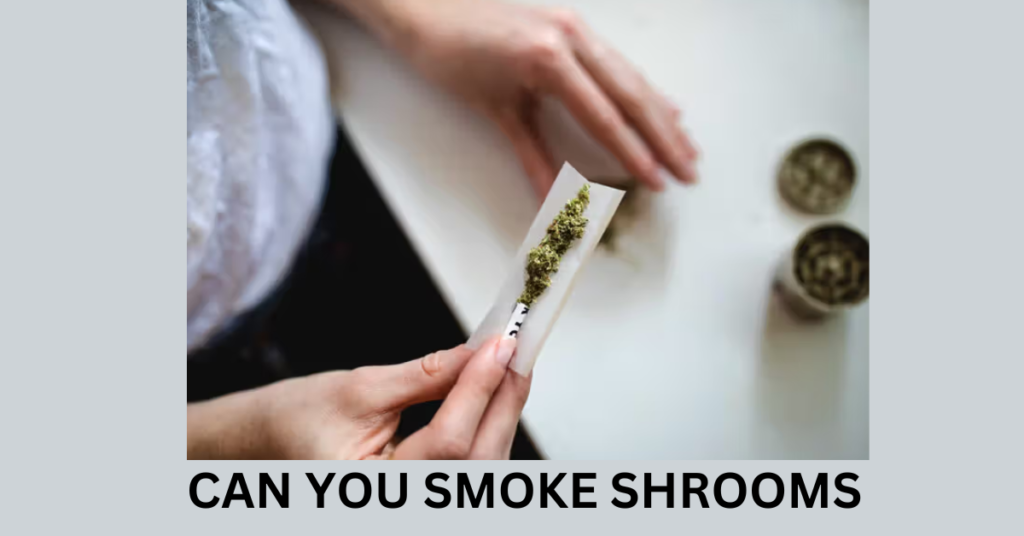Can You Smoke Shrooms – The idea of smoking mushrooms, on the other hand, is less common and more contentious. This practice raises questions about the efficacy, safety, and potential risks associated with inhaling the compounds found in mushrooms. To explore this topic thoroughly, it’s essential to delve into the pharmacology of psilocybin, the effects of smoking different substances, historical precedents, anecdotal reports, and scientific studies.
Pharmacology of Psilocybin
Psilocybin is the primary psychoactive compound found in magic mushrooms (Can You Smoke Shrooms). When ingested orally, psilocybin is metabolized in the body into psilocin, which acts as a serotonin receptor agonist, primarily targeting the 5-HT2A receptors in the brain. This mechanism of action is responsible for the psychedelic effects experienced by users, including alterations in perception, mood, and cognition.
Smoking Substances
Smoking as a method of drug consumption is widely practiced with various substances, including tobacco, cannabis, and certain synthetic drugs. Smoking delivers the active compounds directly into the bloodstream through the lungs, resulting in rapid onset and intense effects. However, not all substances are suitable for smoking, as some may decompose at high temperatures or produce harmful byproducts when combusted.
Historical Precedents
Historical records and anecdotal accounts suggest that smoking mushrooms is not a common or traditional practice. Indigenous cultures that have used mushrooms ceremonially typically consume them orally, often in the form of a tea or as part of a ritualistic ceremony. While there may be instances of experimentation with different methods of ingestion, smoking mushrooms does not appear to have a significant historical precedent.
Anecdotal Reports
Despite the lack of historical evidence, there are anecdotal reports of individuals attempting to smoke mushrooms to achieve a faster onset of effects or enhance their psychedelic experience. These reports vary widely, with some claiming success in achieving altered states of consciousness, while others describe minimal or no effects. The subjective nature of anecdotal reports makes it challenging to draw definitive conclusions about the efficacy or safety of smoking mushrooms.
Scientific Studies
Scientific research on the effects of smoking mushrooms is limited, primarily due to ethical and legal restrictions surrounding the use of psychedelics in research settings. However, there have been studies investigating the pharmacokinetics and pharmacodynamics of psilocybin, which can provide insights into the potential risks and benefits of smoking mushrooms.
One study published in the Journal of Pharmacology and Experimental Therapeutics examined the vaporization of psilocybin and its effects on rats. The researchers found that vaporized psilocybin produced similar behavioral effects to orally administered psilocybin, suggesting that inhalation could be an effective route of administration. However, extrapolating these findings to humans requires caution, as the study was conducted on animals and used vaporization rather than combustion.
Risks and Considerations
While smoking mushrooms may theoretically deliver psilocybin into the bloodstream more rapidly than oral ingestion, it also poses several risks and considerations. The combustion of mushroom material may produce harmful byproducts, such as tar and carbon monoxide, which can damage the lungs and respiratory system. Additionally, the temperature required to vaporize psilocybin may be difficult to control, leading to the degradation of the compound and the formation of potentially toxic substances.
Furthermore, smoking mushrooms bypasses the body’s natural defenses against ingested toxins, such as the liver’s metabolic processes, which can detoxify harmful compounds. This could increase the risk of adverse reactions or overdose, particularly if the dose of psilocybin is not carefully controlled.
Legal and Ethical Considerations
In addition to the potential health risks, the legality of smoking mushrooms varies depending on the jurisdiction. In many countries, psilocybin-containing mushrooms are classified as illegal substances, and possession, sale, or consumption can result in legal consequences. This raises ethical questions about the responsible use of psychedelics and the potential consequences of engaging in illicit drug use.
Conclusion
In conclusion, (Can You Smoke Shrooms) the question of whether one can smoke mushrooms is a complex and multifaceted issue. While there are anecdotal reports of individuals attempting to smoke mushrooms to achieve psychoactive effects, scientific evidence supporting this practice is limited. Smoking mushrooms poses potential health risks, including lung damage and exposure to harmful byproducts of combustion, and may increase the likelihood of adverse reactions or overdose.
Furthermore, the legality of smoking mushrooms raises ethical questions about the responsible use of psychedelics and the potential consequences of engaging in illicit drug use. Overall, while smoking mushrooms may be theoretically possible, it is not a recommended or common method of consumption, and individuals should exercise caution and adhere to harm reduction principles when experimenting with psychedelics.







